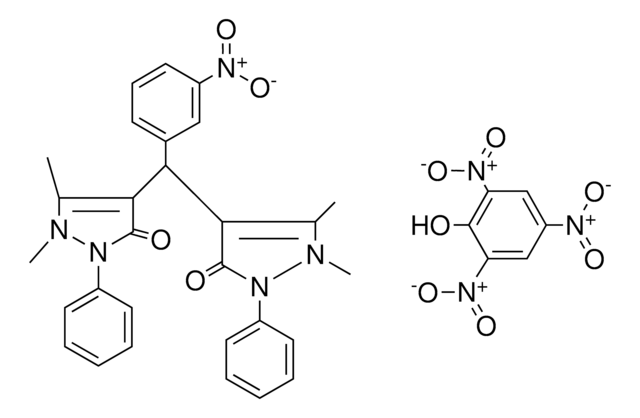1.01384
Brilliant cresyl blue solution
for the staining of reticulocytes for microscopy
About This Item
Recommended Products
Quality Level
form
liquid
IVD
for in vitro diagnostic use
technique(s)
microbe id | staining: suitable
pH
3.7 (20 °C in H2O)
density
1.01 g/cm3 at 20 °C
application(s)
clinical testing
diagnostic assay manufacturing
hematology
histology
storage temp.
15-25°C
General description
The dye stains the nucleic acids in the reticulocytes (Substantia granulofilamentosa), thus enabling reticulocytes to be morphologically distinguished from erythrocytes. The Substantia granulofilamentosa (ribonucleoproteins) can be rendered visible with fresh, non-fixed, young erythrocytes in a supervital staining procedure. Characterized by an intense black-blue hue, it is possible both to determine the number of the reticulocytes (visual microscopic counting) and also to visualize their morphological aspects. Four stages of substantia granulofilamentosa maturation can be distinguished depending on the stage of reticulocyte development: coiled skein (I), incomplete network (II), complete network (III) and granular form (IV). In peripheral blood the development stages III and IV are found most commonly.
The 100 ml bottle provides ca. 1000 applications. This product is registered as IVD and CE marked. For more details, please see instructions for use (IFU). The IFU can be downloaded from this webpage.
Analysis Note
Storage Class Code
12 - Non Combustible Liquids
WGK
WGK 2
Flash Point(F)
Not applicable
Flash Point(C)
Not applicable
Certificates of Analysis (COA)
Search for Certificates of Analysis (COA) by entering the products Lot/Batch Number. Lot and Batch Numbers can be found on a product’s label following the words ‘Lot’ or ‘Batch’.
Already Own This Product?
Find documentation for the products that you have recently purchased in the Document Library.
Related Content
Learn about the clinical study of blood, blood-forming organs, and blood diseases including the treatment, prevention, and stains and dyes used in hematology testing.
Our team of scientists has experience in all areas of research including Life Science, Material Science, Chemical Synthesis, Chromatography, Analytical and many others.
Contact Technical Service




